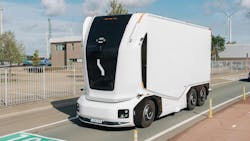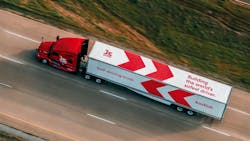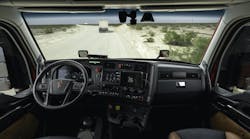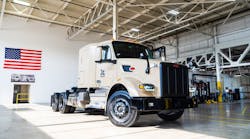Einride pursues NYSE debut through SPAC merger as autonomous trucking race accelerates
Key takeaways
- Kodiak and Einride hit major funding and operational milestones, signaling faster commercialization of autonomous trucking.
- Einride’s planned SPAC deal could bring fresh capital and a larger U.S. push, including a domestic hardware supply chain.
- Kodiak is scaling real driverless operations, targeting 100 trucks for Atlas and eyeing long-haul autonomy next year, though the company is burning through cash.
Two autonomous trucking ventures last week marked milestones, with one hosting an event and the other plans to emulate in a few months.
Leaders of Kodiak AI hosted the company’s first quarterly earnings call since the Silicon Valley-based venture went public in September. That gathering occurred just hours after executives at Einride AB announced they have agreed to merge with Legato Merger Corp. III, a special-purpose acquisition company backed by former investment banker Eric Rosenfeld, who is CEO of Crescendo Partners LP.
If completed, the deal with Legato will bring Sweden-headquartered Einride, which was founded in 2016 and now runs a fleet of about 200 autonomous electric vehicles, to the New York Stock Exchange. Executives expect the combination to be completed in the first half of next year and raise nearly $220 million before expenses and possible share redemptions. The Einride team, led by CEO Roozbeh Charli, is also looking to raise $100 million in the run-up to wrapping its Legato deal.
“We’ve proven the technology, built trust with global customers, and shown that autonomous and electric operations are not just possible, but better,” Charli said in a statement. “The foundation is built, the demand is clear, and our focus is on execution and delivering the future of freight.”
Einride is working with 25 customers, including GE Appliances and a Swedish online pharmacy, and is today generating annualized revenues of about $45 million. Executives say they have signed contracts worth $65 million annually and are looking to expand their U.S. operations—including by building a domestic supply chain for its hardware.
Kodiak's financial results
The path Charli, Rosenfeld, and their associates are pursuing is the same one Kodiak founder and CEO Don Burnette traveled this summer by joining forces with another SPAC, Ares Acquisition Corp. II. On their first earnings call, which came about seven weeks after Kodiak premiered on the Nasdaq, Burnette and his lieutenants said they had finished the third quarter with 10 fully driverless trucks in operation at Atlas Energy Solutions, which transports materials used in oil and gas operations throughout West Texas, which was a doubling from midyear.
Seven-year-old Kodiak, Burnette said, remains on pace to deploy 100 trucks to Atlas in the Permian Basin and has begun hauling double trailers at times for the company. He also said his team plans to launch driverless long-haul operations in the second half of next year. Kodiak has been testing its technology across Texas and the Southeast with notable names J.B. Hunt and Werner Enterprises, among others.
During the third quarter, Kodiak booked $770,000 in revenues and posted a net loss of $270 million that included more than $210 million in losses related to stock issuances. The company’s operating loss was about $30 million, and it burned through about $40 million in cash. Executives said they expect to significantly reduce their materials costs as they scale the business but also plan to return to the markets in the coming year to raise more money.
Shares of Kodiak (Ticker: KDK) fell nearly 20% on Nov. 13 to $6.74 after the company’s earnings report and call but recovered some of that ground the day after, finishing the trading week at $6.74 each. The company’s market capitalization is now about $1.2 billion.
About the Author
Geert De Lombaerde
Senior Editor
A native of Belgium, Geert De Lombaerde has more than two decades of experience in business journalism. Since 2021, he has written about markets and economic trends for Endeavor Business Media publications FleetOwner, Healthcare Innovation, IndustryWeek, Oil & Gas Journal, and T&D World.
With a degree in journalism from the University of Missouri, he began his reporting career at the Business Courier in Cincinnati. He later was managing editor and editor of the Nashville Business Journal. Most recently, he oversaw the online and print products of the Nashville Post and reported primarily on Middle Tennessee’s finance sector and many of its publicly traded companies.




